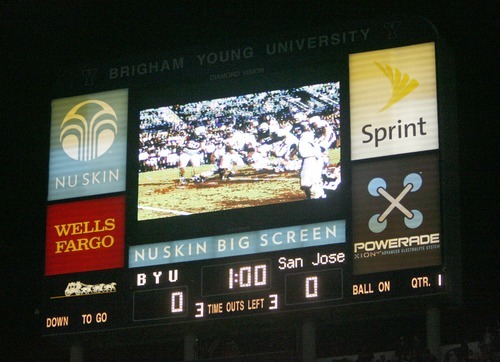This is an archived article that was published on sltrib.com in 2011, and information in the article may be outdated. It is provided only for personal research purposes and may not be reprinted.
Utah Attorney General Mark Shurtleff walked onto the stage at the 2004 annual Usana Health Sciences convention in Salt Lake City.
"Good morning, Usana," he shouted. "And I have some news for you. Last night I talked to Governor Huntsman, and he agreed with me that it is now time to change the name of our state.
"From now on we will be known as Utana."
Shurtleff's jest was met with enthusiastic applause. His long-ago joke, though, still illustrates a basic truth about the state. Because it is home to dozens of companies that sell billions of dollars worth of skin lotions, herbs, vitamin pills and exotic fruit potions to hundreds of thousands of distributors, the companies have scores of supporters, from lawmakers to those who promote economic development in Utah.
And even critics, who say the distribution networks are nothing more than product-based pyramid schemes and that the supplements industry buys "regulatory insurance" by giving lots of money to worthy causes, see their influence at work.
Former state Sen. Scott McCoy, who served in the Legislature from 2005-2009 and was one of the few on Capitol Hill to view the industry with a dose of skepticism, said generally it has been looked upon "pretty favorably" by legislators because of the impact it has had on the state's economy.
"And they also were pretty actively involved with political giving," he said, noting that he always "had questions about their marketing techniques and wasn't sure what they offered really benefited most people."
—
Ringing endorsement • Although detractors point out that most distributors, who also double as company customers, make little or no money, Shurtleff in his 2004 speech followed his quip by offering a ringing endorsement of multilevel marketing in general.
"No matter your birth circumstances, no matter your education, if you work hard, you can realize the dream of financial wealth and success," the state's top law enforcement officer said. "And there is no greater way to do that than through direct sales and multilevel marketing programs."
Shurtleff's praise of multilevel marketing as a distribution method demonstrates just how deeply ingrained the industry is in the state, said Utahn Jon Taylor, author of The Case (for and) against MLM: The Complete Guide to Understanding and Countering the Effects of Endless Chain Opportunity Selling — or Product-based Pyramid Schemes.
MLM companies "exert a tremendous amount of influence" among the state's politicians and the business community in general, said Taylor, who operates the website http://www.mlm-thetruth.com. "They regularly contribute to political campaigns and humanitarian efforts, and many are Olympic sponsors. And that has given them a lot of credibility and access."
That credibility takes many forms, from state and federal lawmakers passing laws favorable to the industry's interest, to companies showcasing their community involvement through everything from philanthropic giving to the XanGo-emblazoned jerseys worn by the players of Real Salt Lake, Utah's professional soccer team.
The companies maintain they follow the law closely, offer legitimate business opportunities and strive to be good corporate citizens. And their message has found willing allies among Utah's statesmen such as Sen. Orrin Hatch and Rep. Jason Chaffetz, a former spokesman for Provo-based Nu Skin Enterprises.
—
"Major exporters" • "These are good companies to have in Utah," Chaffetz said. "They have changed a lot over the years, though. Now many of them generate most of their revenue outside the United States. And that means they are major exporters, which offers a real benefit for our state's economy."
The congressman downplayed the views of industry critics who contend that getting involved in MLM is a bad deal for distributors because it relies on the continuous recruitment of new distributors to replace those who have lost money and abandoned their dreams of striking it rich.
"I don't think that is necessarily the case," Chaffetz said. "It is really a question of risk and reward. Of course, some people are not going to make any money, but where else can you start a business for a relatively small amount of money?"
Utah economic devel-opment officials also are hesitant to speak ill of an industry that employs thousands of Utahns and contributes billions in revenue to the state's economy.
"Many of those companies have survived the test of time," said Jeff Edwards, president and CEO of the Economic Development Corp. of Utah. "They are of global importance. And while I understand there are differing opinions about their distribution methods, from an economic-development standpoint it has never been an issue with any of the companies we've tried to bring to Utah."
Ritch Wood, chief financial officer at Nu Skin, said one of that company's goals is to be seen as a good corporate citizen in its home state. "While I'm sure it doesn't hurt to have our name out there [in the community], I don't think we're getting a lot of benefit since most of our growth is now coming from outside the country."
Nu Skin, the largest and most successful of the Utah-based direct sales companies, sponsors the NuSkin Theatre at EnergySolutions Arena in downtown Salt Lake City and the Nu Skin Jazz Dancers who perform during the home games of the Jazz, the state's professional basketball franchise. The company's name is also displayed prominently on scoreboards at Brigham Young University's LaVell Edwards Stadium.
"As a company, it is important for us to have our name associated with good organizations and good causes," Wood said. "And that is why we have long-standing relationships with BYU and the Utah Jazz."
—
Skeptic of good deeds • Eric Scheibeler, author of Merchants of Deception, a book about Amway, and one of the better-known critics of direct sales organizations in the country, offers a much different view of the industry's efforts.
"It is regulatory insurance," he said. "There is this idea out there that if a company is making a lot of money and willingly spends it on good causes, that they are doing everything right.
"It gives them an air of legitimacy, especially if you don't look at how they make their money."
For his part Shurtleff, who along with many other Utah politicians has been the beneficiary of tens of thousands of dollars in campaign contributions from a number of the state's MLM companies, offers no apologies for his support of the industry.
During his speech to Usana distributors, Shurtleff also mentioned why the MLM industry is viewed as so important to the state's economy.
"You pay a lot of taxes and it is because of you and the hard work you do, so keep selling, keep spreading the word, keep getting people involved because it helps us back here at home," he said.
—
International success • Shurtleff's words may be truer than ever in that regard. Utah MLM companies such as Nu Skin and XanGo now see a lot more growth outside the United States than ever before.
Evidence of that success is often visible on the streets of downtown Salt Lake when companies such as Usana, MonaVie and Nu Skin stage their international conventions. Those events draw tens of thousands of distributors to the state every year from all over the world for pep talks, training and new-product presentations.
"It's big business for us, and it provides tremendous economic value to the state," said Shawn Stinson of the Salt Lake Convention and Visitors Bureau. So far this year, 15 MLM companies have staged their conventions in Salt Lake City, bringing in nearly 45,000 visitors, who combined generated $42 million in direct economic impact on the community, he said.
Still, there are others who are concerned about the MLM industry in Utah and the influence it wields.
"I don't think that any of the MLM legislation that the Legislature passed in recent years was looked at carefully," said Sheryl Allen, a former member of the Utah House of Representatives. "There were a lot of advocates at the Legislature who were all for removing any prohibitions on how they operate.
"I think the regulation of MLMs is a weakness both nationally and in our state."
For the industry, the future stretches beyond Utah and the United States. Aaron Garrity, co-founder and chairman of XanGo, is up-front about how his sponsorship of the Real Salt Lake soccer team plays into his company's overall plans to increase its international presence and influence.
He termed the deal that placed the XanGo name on front of each player's jersey the holy grail in sports advertising. "Never before in professional sports had there been such a sponsorship," he said.
XanGo had been approached to buy signage in EnergySolutions Arena, Garrity said. "But from our business perspective, we're an international company, we're in 34 countries around the world, and soccer hands-down is the number one played sport in the world. We're seen everywhere now."
Tom Harvey contributed to this report.







